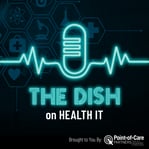Pharmacy Interoperability: Challenges, Opportunities, and Urgency
In this episode of The Dish on Health IT, host Tony Schueth leads an engaging discussion on pharmacy interoperability, a topic at the center of a recently published POCP whitepaper funded by the NCPDP Foundation and supported by Surescripts. Joining him are John Hill, Executive Director of the NCPDP Foundation, and Larry King, Director of Intelligent Prescribing at Surescripts, to unpack the white paper’s findings and explore the future of pharmacy’s role in patient care.
The conversation begins with Tony laying the foundation for the discussion by defining pharmacy interoperability as the seamless, bi-directional exchange of health information between pharmacy care settings and the broader healthcare ecosystem. This connectivity ensures that data flows effortlessly without adding complexity to the workflows of pharmacists or other providers. Tony highlights the POCP white paper, which outlines critical opportunities and challenges in achieving this vision. The document calls for leveraging standards and technology to integrate pharmacists as key contributors to care teams, addressing not only medication management but also broader clinical services.
John Hill and Larry King bring their unique perspectives to the conversation. John shares insights into how the NCPDP Foundation is focused on grants that expand the pharmacist's role, improve patient safety, and enhance access to care. He emphasizes that the white paper marks a pivotal step toward identifying gaps in interoperability and opportunities to engage pharmacists more fully in patient care. Larry draws from his experiences as a pharmacist and industry leader, highlighting the complexity of patient needs and the roadblocks that prevent pharmacists from working to the highest and best purpose of their license. Both guests underscore the need for workflow-friendly solutions to reduce administrative burdens and allow pharmacists to spend more time on meaningful, patient-centered work.
The discussion delves into the growing role of pharmacists, who are increasingly stepping beyond dispensing medications to provide direct patient care services, including immunizations, chronic disease management, and comprehensive medication reviews. Tony and his guests agree that pharmacies are uniquely positioned to fill gaps in care, especially in underserved areas, and to offload basic services from overburdened primary care practices. However, for pharmacies to step into this larger role, significant progress is needed in interoperability, reimbursement models, and technology adoption.
A key focus of the conversation is the critical role of standards in enabling interoperability. John elaborates on how NCPDP is working to ensure data can be exchanged seamlessly, highlighting their collaboration with HL7 on standards like the eCare Plan. He explains that standards not only ensure data consistency across systems but also reduce the burden on users by integrating into existing workflows. Larry adds that Surescripts’ efforts to implement interoperable solutions, such as Qualified Health Information Networks (QHINs) under TEFCA, demonstrate the potential of standards to create a nationwide framework for secure data exchange.
The guests also discuss the importance of sustainable financial models to incentivize investment in interoperability. Larry points out that while there are some reimbursement programs for clinical services, inconsistencies remain a significant barrier. Both guests stress that the industry must develop scalable payment models that align with pharmacists’ expanded roles and address the technology investments required to connect pharmacy systems with the broader care continuum.
Emerging technologies like AI also feature prominently in the discussion. Larry shares how Surescripts is leveraging AI for tasks like parsing patient instructions and monitoring network activity for compliance issues. John highlights NCPDP’s efforts to explore how AI can support standards adoption and governance. Both agree that while AI offers enormous potential to optimize pharmacy workflows and enhance clinical insights, it must be implemented cautiously, with safety and security as top priorities.
As the episode nears its conclusion, the guests reflect on the ideal future state of pharmacy interoperability. Larry envisions a world where patients experience seamless care, with providers and pharmacists having immediate access to comprehensive, accurate health information. This would eliminate redundant data collection, reduce errors, and enable faster, more informed decision-making. John echoes this vision, emphasizing that interoperability can empower pharmacists to operate at the top of their licenses, improving patient outcomes and addressing provider shortages.
Tony closes the discussion by encouraging listeners to take actionable steps, such as engaging with workgroups like NCPDP’s Work Group 20, reviewing the POCP white paper, and participating in industry initiatives that drive interoperability forward. John and Larry emphasize the urgency of acting now, describing this as a once-in-a-generation opportunity to create lasting change in healthcare delivery.
For more insights and resources, including links to the white paper and details on key industry initiatives, check the episode summary. Subscribe to The Dish on Health IT on Apple Podcasts, Spotify, or Healthcare Now Radio to stay informed. Let’s continue the journey toward a more connected and efficient healthcare system—because health IT is a dish best served hot!
Related Content:
- NCPDP Foundation abridged results report
- NCPDP Foundation website (for grant proposals in connection with the CTA of future opportunities for grants)
- NCPDP Standards website (for encouraging involvement/collaboration in WGs in connection with the CTA of getting involved/supporting the mission)
- Surescripts blog: Ready for Action: Advancing Pharmacy Interoperability






